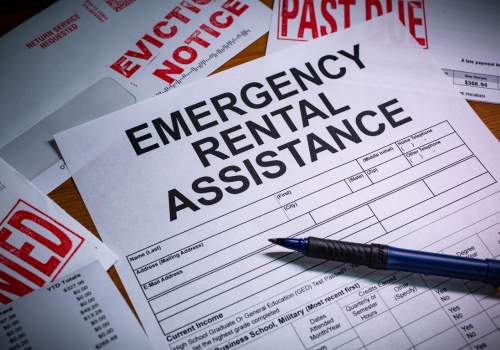16 Things You Must Do to Avoid a Devastating Eviction
You’ve probably heard horror stories about evictions – families scrambling to find new homes, belongings piled on sidewalks, and credit scores in ruins.
While the threat of eviction can feel overwhelming, you don’t have to become another statistic.
Whether you’re a seasoned renter or just starting out, there are concrete steps you can take to protect yourself from this devastating experience.
From establishing foolproof payment systems to building strong relationships with your landlord, these sixteen essential strategies will help safeguard your housing stability.
Let’s explore how you can secure your home and maintain peace of mind, starting with the most fundamental aspects of tenant responsibility.

Pay Rent On Time
Tenants must prioritize timely rent payments as their primary obligation under any lease agreement.
You’ll protect your legal rights and maintain control over your living situation by submitting payments before or on the specified due date.
Set up automatic bank transfers or payment reminders to guarantee consistent compliance with your contractual obligations.
If you anticipate payment difficulties, you must communicate with your landlord immediately.
Many jurisdictions require formal written notice before initiating eviction proceedings, but don’t rely on this buffer.
Take proactive steps to document all payments through checks, money orders, or electronic transfers that generate receipts.
You’re legally entitled to proof of payment, so maintain thorough records to defend against potential disputes.
Communicate With Your Landlord

Open communication with your landlord serves as a cornerstone of maintaining stable tenancy rights.
When you encounter financial difficulties or maintenance issues, don’t wait until problems escalate.
Initiate contact immediately and document all interactions in writing.
You’ll protect your legal position by sending formal emails or certified letters detailing concerns, repair requests, or payment arrangements.
If you anticipate late rent payment, notify your landlord at least five days before the due date, proposing a specific payment plan.
This proactive approach often prevents the initiation of eviction proceedings.
Keep copies of all correspondence and maintain a communication log with dates, times, and discussion points.
Your landlord’s responses, or lack thereof, may become vital evidence if legal disputes arise.
Document Everything
Maintaining detailed records stands as your primary defense against potential eviction proceedings.
You’ll need to document every interaction, payment, and maintenance request related to your tenancy.
Keep copies of your lease agreement, rent receipts, canceled checks, and all written communications with your landlord.
Take photos of your unit’s condition during move-in and move-out, capturing any existing damage or repairs needed.
Record dates, times, and details of verbal conversations in a dedicated log, and follow up significant verbal discussions with written confirmation via email or certified mail.
Save all notices received from your landlord, including maintenance reports and lease violations.
Store these documents both digitally and in hard copy format, ensuring you’ve got backup copies in a secure, off-site location.
Know Your Tenant Rights

Understanding state-specific tenant laws forms the foundation of protecting your residential rights.
You’ll need to research your state’s landlord-tenant statutes, fair housing laws, and local ordinances that govern rental properties.
These laws outline your rights regarding security deposits, maintenance responsibilities, privacy, and eviction procedures.
You’re entitled to specific protections under federal law, including freedom from discrimination and the right to a habitable dwelling.
Don’t let your landlord violate these fundamental rights. Familiarize yourself with legal notice periods, repair obligations, and proper eviction protocols.
You can access your state’s tenant rights through legal aid websites, housing authorities, or tenant advocacy groups.
If your landlord attempts to circumvent legal procedures, you’re empowered to challenge illegal eviction attempts through your local housing court.
Keep Copies Of Lease Agreements
Your lease agreement serves as the primary legal document governing your tenancy, building upon the rights established by state and federal laws.
You must maintain multiple copies of this critical document in both physical and digital formats, storing them in secure, easily accessible locations.
Document every modification to your original lease through written amendments, including rent adjustments, maintenance agreements, or policy changes.
Don’t rely on verbal agreements – they’re difficult to prove in court.
Scan all signed documents immediately and store digital copies in cloud storage platforms you control.
Keep dated photographs of your physical copies and send one set to a trusted family member or legal representative.
If your landlord requests the original, provide only copies unless legally required otherwise.
Your ability to produce this documentation quickly can mean the difference between maintaining your housing and facing eviction proceedings.
Follow Property Rules

By adhering to property rules outlined in your lease agreement, you’ll establish a solid defense against potential eviction proceedings.
Study and comply with all regulations regarding noise levels, pet restrictions, occupancy limits, and parking assignments.
These guidelines aren’t arbitrary constraints but legally binding terms that protect your tenancy rights.
Don’t risk violations by hosting unauthorized residents, modifying the property without permission, or engaging in prohibited activities.
Your lease likely contains specific provisions about maintenance responsibilities, waste disposal, and common area usage.
Violating these terms gives landlords legitimate grounds for eviction actions.
Document your compliance efforts and immediately address any rule violation notices. If you receive warnings, respond in writing and promptly correct the issue.
This creates a verifiable record of your commitment to following property regulations, strengthening your position against eviction attempts.
Maintain Clean Living Conditions
Beyond following property rules, maintaining sanitary living conditions serves as a fundamental defense against eviction proceedings.
Landlords can legally terminate your tenancy if you create unsanitary conditions that violate health codes or lease provisions.
You’ll need to prevent pest infestations, properly dispose of garbage, and maintain functional plumbing systems.
Regular cleaning isn’t just about aesthetics – it’s about protecting your legal right to remain in the dwelling.
Document your cleaning routine and any maintenance requests you’ve submitted.
Take photos of your living space monthly to prove you’re maintaining acceptable standards.
If you’re facing accusations of poor housekeeping, you’ll have evidence to defend your position.
Report Maintenance Issues Promptly

Promptness in reporting maintenance problems protects both your tenancy rights and the property’s condition.
You’re legally obligated to notify your landlord of repairs needed to prevent property deterioration.
Document every maintenance request in writing, including dates, descriptions, and photos of the issues.
Don’t wait until small problems become major catastrophes. Water leaks, electrical issues, pest infestations, or structural concerns require immediate attention.
If you fail to report these problems, you could be held liable for resulting damages and face potential eviction for negligence.
Create a paper trail by sending maintenance requests via certified mail or email, and keep copies of all correspondence.
If your landlord doesn’t respond within the legally mandated timeframe, you’ll have documented evidence to protect your rights and defend against potential eviction proceedings.
Get Renters Insurance
A thorough renters insurance policy serves as a critical safeguard against potential eviction risks.
You’ll protect yourself against liability claims that could otherwise drain your finances and compromise your ability to pay rent.
Most policies cover damage to neighboring units caused by water leaks, fires, or other incidents originating from your residence.
Your policy should include personal property coverage, liability protection, and loss of use coverage.
If you’re forced to temporarily relocate due to covered damages, loss of use coverage will help pay for alternative housing, guaranteeing you don’t fall behind on rent payments.
Select coverage limits that adequately protect your assets, and verify your policy meets your landlord’s minimum requirements.
Don’t overlook additional endorsements for specific risks like flooding or pet-related incidents.
Create An Emergency Fund

Financial stability requires maintaining a dedicated emergency fund equal to at least three months of rent and essential expenses.
You’ll need to calculate your monthly rent, utilities, food, transportation, and other critical costs to determine your target savings amount.
Don’t commingle these funds with your regular checking account.
Open a separate high-yield savings account specifically for your emergency fund.
Set up automatic monthly transfers from your primary account to guarantee consistent contributions.
You should prioritize building this fund before allocating money to non-essential expenses or investments.
If you experience job loss, medical emergencies, or reduced income, you’ll have a financial buffer to prevent missed rent payments and potential eviction.
Consider this fund as your personal insurance policy against housing instability and legal complications with your landlord.
Request Payment Plans When Needed
Even with a robust emergency fund, unforeseen circumstances may impact your ability to pay rent on time.
When facing potential payment difficulties, don’t wait until you’ve missed rent to take action.
Contact your landlord immediately to request a payment plan arrangement.
Submit your payment plan request in writing, clearly outlining your financial situation, proposed payment schedule, and timeline for catching up on rent obligations.
Include documentation of your hardship, such as medical bills or proof of job loss.
Reference your positive payment history and commitment to fulfilling lease obligations.
You maintain legal rights during this process.
Many jurisdictions require landlords to evaluate reasonable payment arrangements before initiating eviction proceedings.
Document all communication and agreements in writing, and obtain signed acknowledgment from your landlord regarding any modified payment terms.
Avoid Illegal Subletting

Throughout tenancy agreements, subletting without explicit landlord permission constitutes a serious lease violation that can trigger immediate eviction proceedings.
You’ll need to obtain written authorization before allowing anyone not listed on the original lease to occupy your rental unit, even temporarily.
Don’t attempt to circumvent subletting restrictions through informal arrangements or by calling the occupant a “guest.”
Most leases specifically define the maximum duration for guest stays, typically 14 days.
If you’re considering sharing your space, you must first review your lease terms and submit a formal subletting request to your landlord.
They’ll likely require a background check and additional paperwork for the potential subtenant.
Keep Noise Levels Down
Excessive noise remains one of the leading causes of tenant eviction and neighbor complaints in residential settings.
You’ll need to maintain reasonable sound levels during all hours, particularly between 10 PM and 7 AM when most lease agreements specify quiet hours.
Don’t risk violating local noise ordinances or your rental agreement.
Install sound-dampening materials like rugs, curtains, and foam panels to minimize noise transmission.
Keep your TV, music, and gaming systems at moderate volumes, and use headphones when possible.
If you’re hosting gatherings, inform neighbors in advance and guarantee guests exit quietly.
Be especially mindful of bass frequencies, which travel easily through walls and floors.
Monitor children’s activities and pet noise, as these can trigger complaints.
Consider Rental Assistance Programs

Rental assistance programs can help bridge financial gaps when you’re struggling to make monthly payments.
You’ll find these programs through local housing authorities, non-profit organizations, and government agencies.
The U.S. Department of Housing and Urban Development (HUD) offers Section 8 vouchers and other subsidies that can cover a considerable portion of your rent.
Don’t wait until you’re behind on payments to explore these options. Research eligibility requirements, gather necessary documentation, and submit applications promptly.
You’ll need proof of income, tax returns, bank statements, and verification of your current housing situation.
Many programs operate on a first-come, first-served basis or maintain waiting lists.
Local churches, community action agencies, and emergency assistance funds may offer additional short-term rental support.
Read Notices Carefully
Scrutinize any notice you receive from your landlord with extreme attention to detail.
You’ll need to identify the specific type of notice, whether it’s a notice to pay rent, cure a lease violation, or vacate the premises.
Each notice type triggers different legal timelines and requires distinct responses to protect your rights.
Document the date you received the notice, as this establishes your response deadline.
Verify that the notice complies with state law requirements, including proper service method, mandatory waiting periods, and required content.
If you spot procedural errors in the notice, document them immediately – they could serve as defenses in an eviction proceeding.
Don’t ignore notices hoping they’ll disappear; this strategy typically strengthens the landlord’s case and weakens your legal position.
Exercise your right to respond within the specified timeframe.
Seek Legal Help Early

Consulting a legal professional immediately after receiving an eviction notice can greatly strengthen your position and protect your rights.
A qualified tenant rights attorney can identify procedural errors in the notice, assess potential defenses, and guarantee your landlord hasn’t violated state or local housing laws.
Don’t wait until the last minute, as this reduces your legal options.
You’ll find free or low-cost legal resources through legal aid societies, tenant advocacy groups, and local bar associations.
Many attorneys offer free initial consultations to evaluate your case.
Document all interactions with your landlord, gather evidence of rent payments, and maintain records of property conditions.
Your lawyer can use this documentation to negotiate with your landlord’s attorney, file necessary court motions, or represent you during eviction proceedings.
Time is critical – each day you delay seeking counsel diminishes your chances of a favorable outcome.
FAQs
Can My Landlord Evict Me if I’m Hospitalized for an Extended Period?
Your landlord can’t legally evict you solely due to hospitalization, as this may violate disability protection laws. However, you’ll need to guarantee rent payments continue and communicate your situation to maintain your tenancy rights.
How Long Does an Eviction Stay on My Credit Report?
Like a persistent shadow, an eviction judgment typically haunts your credit report for seven years from the filing date. You’ll need to wait out this period, as it can’t be removed unless it’s proven inaccurate.
Can Roommates Be Individually Evicted From a Shared Lease?
You can’t typically be individually evicted if all roommates signed the same lease. However, you’ll remain jointly liable unless the landlord specifically agrees to remove you through a lease modification or new agreement.
What Happens to My Security Deposit if I’m Evicted?
Your security deposit can be withheld by your landlord to cover unpaid rent and damages beyond normal wear. You’re entitled to an itemized statement, but eviction may complicate your ability to dispute deductions.
Can My Landlord Evict Me for Having an Emotional Support Animal?
Where there’s law, there’s protection. You can’t be evicted solely for having an emotional support animal if you’ve provided proper documentation under the Fair Housing Act and requested reasonable accommodation from your landlord.
Final Thoughts
You’re now equipped with an arsenal of catastrophe-preventing strategies that’ll make your tenancy virtually bulletproof.
By implementing these legally-sound protocols, you’ll establish an impenetrable defense against eviction proceedings.
Your meticulous documentation, punctual payments, and strategic compliance with lease provisions shall create an ironclad residential status.
Remember: one missed rent payment can trigger a devastating domino effect, potentially resulting in immediate legal action and subsequent housing instability.